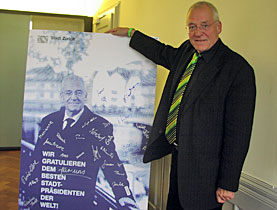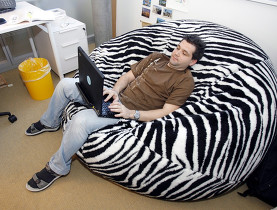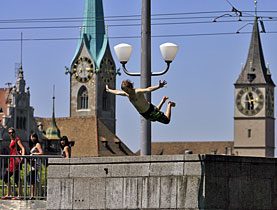Zurich’s cycling mayor rides city to success

The popular mayor of Zurich, Elmar Ledergerber, has announced his resignation for family reasons – a move that has surprised many observers.
Ledergerber tells swissinfo about the ups and downs of his job, the effect of the financial crisis on Zurich and his thoughts on winning second place in the World Mayor competition.
The mayor, who has been in office since 2002, announced on Wednesday that he was stepping down to spend more time with his youngest teenage son. The 64-year-old will give up his post in spring.
A dynamic personality, Ledergerber has been the public face of Switzerland’s financial centre, helping to cement its international reputation for a high quality of life as well. But the centre-left Social Democrat has also earned criticism for not seeing through major building projects.
Ledergerber was named one of the year’s most outstanding mayors by a London-based think tank earlier this month. swissinfo met the flamboyant mayor – he was wearing an eye-poppingly bright green tie and matching watch – at his office in Zurich city hall.
swissinfo: You have said that you are leaving your job as mayor with mixed feelings.
Elmar Ledergerber: I’m leaving a job which was very exciting and interesting. I had a very direct connection to the population and a very good team. Leaving is always a little bit sad so this is one part of the story.
The other part is that I am really happy to go into a future where I will have a little bit more time for me, for my family, for personal relationships – all things which I have neglected a little bit these past years because running around for 80-90 hours a week is a very taxing job.
swissinfo: How big a challenge has it been to run a city like Zurich?
E.L.: It is a very big challenge. The most important thing is to lead a team, like the city council, so that they are cooperating and running this wonderful city. The second is to give a face to our city, for the people here, in our country and even on an international level.
swissinfo: One of the things the world mayor jury said was that you made everyone, Swiss or non-Swiss, feel at home in Zurich. How important is this immigration aspect?
E.L.: We have 31 per cent foreigners in Zurich, coming from around 170 ethnic groups and countries. So it is a big challenge to help them integrate and live together with the Zurich population without creating bigger tensions. The city did really well in this respect and we do not really have race or ethnic tensions. This multicultural atmosphere is, I would say, one of our unique selling propositions.
swissinfo: And Zurich always comes top in quality-of-life surveys.
E.L.: We have been top seven times in a row in an international survey. But this is not a God-given outcome. It is the result of very hard political work, clear-cut strategies and large efforts by our city council and population. Quality of life is not only environment, it is social networks, relations, stability and security and it is political culture. So we have a unique mixture which makes life here really outstanding.
swissinfo: What have been the high points so far during your tenure as mayor?
E.L.: Of course this award as the second best mayor in the world – and the best male if I may mention that! This is something that does not happen every year. Apart from that there are these slow processes which do not have an explosive effect but which are developing slowly. Quality of life is a part of this. We have developed our cultural life as well and it can be compared with that of bigger and more important cities in Europe.
swissinfo: What about things that haven’t gone so well?
E.L.: The most difficult point is the flip side of our success. Because Zurich has become so attractive it’s almost impossible to find a flat. But we are constructing 2,500 flats every year. Normally I say I prefer to have this problem rather than Zurich not being so attractive – so we can live with this.
Like many other cities there is a drug problem. It is not so high as it once was, we are controlling it, but it exists. We always have to invest a lot to maintain a high security level in the city and if we compare that with other cities, we are well positioned.
swissinfo: And what about the financial crisis? Zurich is full of big banks – can you see the situation affecting the city?
E.L.: All economic and financial centres have a problem with a financial system that is on the verge of collapsing. This is a big threat and can’t see the end of it yet. Since Zurich is one of the ten most important financial centres in the world we will be especially affected. The financial centre is contributing a lot to our tax income so we will really soon be in a bad position.
Of course we have some financial reserves, we are not indebted and we are hoping that within three years the situation will be normalised. Currently 25 per cent of jobs are created by the financial sector and if this were not so we would have a very serious problem. But I’m optimistic that Zurich will play an important role in the financial sector in the future.
swissinfo: Overall what would you say makes Zurich such a special place?
E.L.: There are very many reasons, but a special attraction is that we are the city of short distances. With 380,000 people we are a small city compared with others and you can reach almost everywhere by foot, bike or on public transport. This makes for a cosy atmosphere.
swissinfo: And for you personally?
E.L.: I like it that every day when it’s not raining I can go by bicycle. It’s faster than with the car and public transport and it gives me the chance to move my old legs a little bit. I can move around the city without bodyguards and meet people without security restrictions and this is a huge advantage, professionally and also for my quality of life.
swissinfo-interview: Isobel Leybold-Johnson in Zurich
Born in 1944, Elmar Ledergerber has a degree in history and literature as well as in economics. He obtained his PhD in economics at the university of St Gallen. In 1977 he established a consulting firm, which he managed for more than 20 years.
He was elected mayor of Zurich in March 2002. Before that he had been active in Zurich politics and nationally, as a parliamentarian.
The mayor leads a city council, which consists of nine members from four political parties.
He is divorced and a father of three. His youngest son is almost 16.
Switzerland’s largest city and financial heart is situated in the eastern part of the country. It has around 380,000 residents. Around three million people live in Zurich’s metropolitan area, making it one of Europe’s most densely populated regions.
The economy is based on services, with financial services being key. High-tech industries also abound. Zurich also has 40,000 students, including at the university and the Federal Institute of Technology.
Zurich is famous for its lake, clean air and pristine streets. In addition, it has more than 50 museums, galleries and an opera house.

In compliance with the JTI standards
More: SWI swissinfo.ch certified by the Journalism Trust Initiative




You can find an overview of ongoing debates with our journalists here. Please join us!
If you want to start a conversation about a topic raised in this article or want to report factual errors, email us at english@swissinfo.ch.